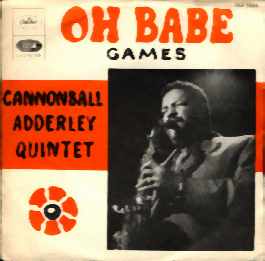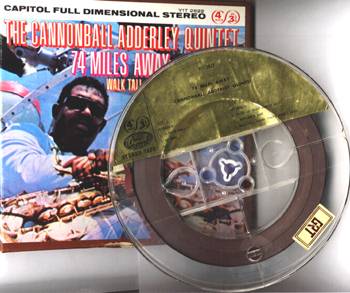|
| Discography |
| About Julian |
| About Site |
Since Dec,01,1998
©1998 By barybary

![]()
"74 MILES AWAY" |
![]()
 |
very rare Japan reissue on Lp (red vinyl)
|
|
|
45 Rpm French issue |
|
|
| 4 Tracks Reel To Reel, out of stock at Amazon.com !!! |
Cannonball & Nat Adderley on the horn section
Josef Zawinul on piano and electric piano,
Vic Gaskin on bass,
Roy Mc Curdy on percussion.
side one
DO DO DO (What Now Is Next?) by Nat Adderley and Gail Fisher
Upam Music (BMI) 6:20
I REMEMBER BIRD by
Leonard Feather
Model Music C0. (ASCAP) 6:54
WALK TALL (Baby, That's What I Need) by J. Zawinul-E. Marrow-J Rein
Zawinul Music (BMI) 2:38
side two
74 MILES AWAY by Josef Zawinul
Zawinul Music (8M1) 13:47
OH BABE by Nat
Adderley and Julian Adderley
Upam Music (BMI) 5:28
|
"Live," whether used as an adjective or a verb, seems singularly appropriate when it is applied to Julian "Cannonball" Adderley and his Quintet. No jazz group presently active seems to come alive more buoyantly on the bandstand, and no other combo has benefited more fully from the advantages of recording live. This latest session was a triply happy occasion for the Adderleys, since it marked a family reunion. Julian and Nat had brought their wives to Hollywood. Mr. & Mrs. Adderley Sr. were in town on a visit from Florida, visiting with their sons, and having a ball. Mr. Adderley, who used to be a cornetist, commented after one of Nat's solos: "You sound almost as good as I used to." During "I Remember Bird," he said: "I remember me!" Their radiant pride was an additional incentive to the two sons, as the recording got under way before a hip and responsive crowd. Cannonball, of course, is the orator supreme among jazz combo leaders. He neither ignores his listeners nor puts them on nor condescends to them; he addresses them as if they were newfound friends. It is in this spirit that you hear the session start; after being presented to the audience by KBCA disc jockey Jay Rich, Julian introduces the opening number, "Do Do Do." All the way from the opening vamp by Joe Zawinul on electric piano, this Nat Adderley tune has the spirit of the blues, transmuted into 32-bar chorus form. As you might deduce from the subtitle ("What Now Is Next"), this beguilingly basic theme has been equipped with lyrics (by Gail Fisher, the prettiest songwriter in town), and will no doubt be heard as a vocal vehicle in due course, following a pattern established by Miss Fisher's lyrics for "Mercy, Mercy, Mercy!" Many years ago, Julian Adderley said: "I listened to all the other alto players ... something seemed to be lacking. When I first heard Bird, I knew immediately that that was it." From that point on, Charlie Parker provided the impetus and inspiration behind Cannon's development of his own style. As an early friend and admirer of Bird, and as an Adderley fan ever since he first breezed into New York in 1955,1 was doubly gratified when Cannon used my dedicatory blues, "I Remember Bird," as a basis for his own tribute to Parker's memory. Julian, Nat and Joe all dig in here with solos straight from the heart. "Walk Tall," by Joe Zawinul, has a history not unlike that of "Mercy." The latter grew out of a background theme he had developed for Esther Marrow, a singer he was coaching. Miss Marrow, whose background clearly goes back to church music, has appeared with Duke Ellington's band at various houses of worship, performing in Duke's program of sacred music. "WalkTall," which has the same sanctified feeling as "Mercy," was a collaboration between Zawinul, Miss Marrow and J. Rein. Again we have a candidate for vocal treatments, under the alternate title, "Baby, That's What I Need." Joe's tune, "74 Miles Away," derives its name from the meter. Written in 7/4, it swings with perfect ease and includes some of the most adventurous improvisation of the entire session. Julian establishes a carefully-constructed tension, using upper-register notes with a montuna-like background by Joe, bassist Victor Gaskin and drummer Roy McCurdy. Nat starts in a meditative mood, establishes a Middle Eastern scalar quality, then ventures into some wild sound effects that may convince you he is playing bass trombone. With the Adderleys shaking tambourines to build the intensity, Zawinul offers a magnificent demonstration of the scope and resourcefulness he can bring to modern jazz piano. The baffling tonal innovations were produced by the insertion of a tambourine over some of the strings. "Oh Babe," as Julian says, is "the stone, natural-born blues." Nat's vocal (he started his career as a child singer before taking up a horn) shows how you can have fun with the blues without satirizing it. The screams, by the way, are contributed by various members of the group at whom Nat pointed the microphone when he reached the tenth bar of each vocal chorus. Not long ago, Cannon told me: "When we have a hit going for us, people may come in the club just to hear that number. But once they're inside, we have no trouble getting them interested in everything we do. We play things that are very commercial, others that are very modern, and we like ballads, and of course the blues. But we never play anything we don't like and don't believe in." These sides offer exhilarating evidence of Julian Adderley practicing what he preaches. LEONARD FEATHER Produced by DAVID AXELROD |


